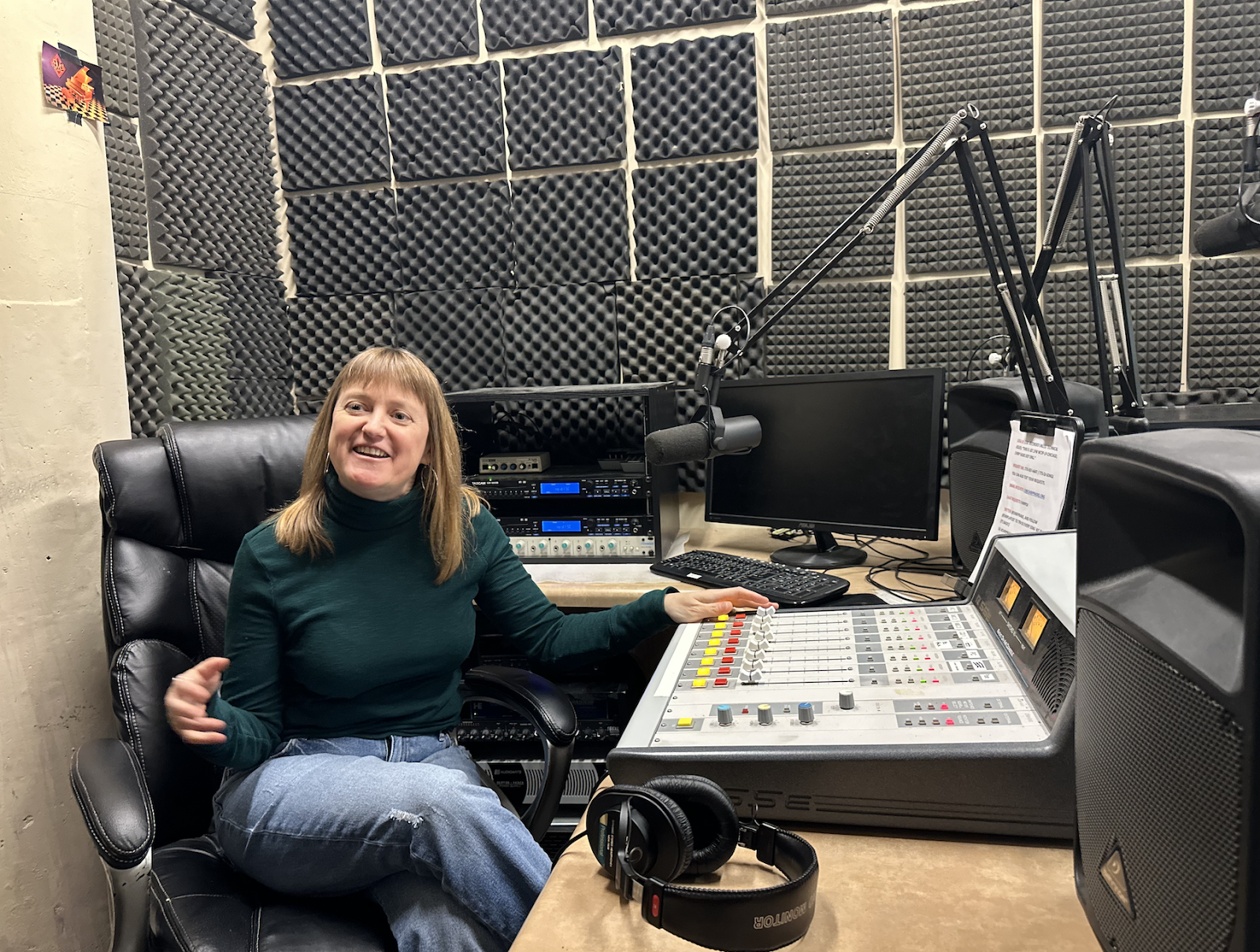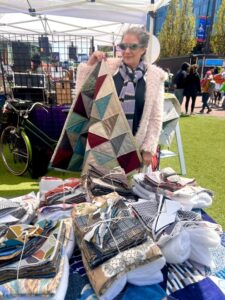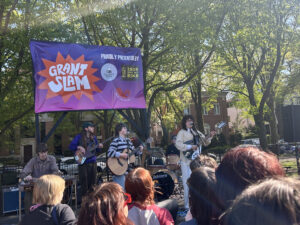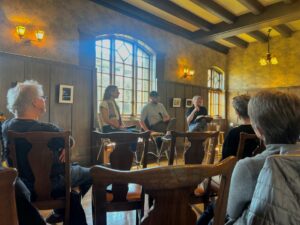As the founder of CHIRP, a cookbook collector, a master fundraiser, radio believer and the figure who coined “radio fate,” Shawn Campbell has endless tricks up her sleeves. If you have a moment, she’d be happy to share it with you.
Imagine riding along the road with the radio on while on your way to the school dance. All of the sudden “Put a Little Love in Your Heart,” sung by Annie Lennox and Al Green, comes on. You now know you’re going to have a very good night.
This was the basic concept of Campbell’s “radio fate.” In high school, she decided that a given song played on the radio could predict the outcome of that day. Some songs were good luck, others not so much.
“That [Lennox and Green] song was on the radio a lot and was a good radio fate song. If you heard that song on the radio and then you went to the football game, you would certainly end up talking to the boy that you liked,” she said. It was up to the listener to relate or not.

On a gloomy Thursday, the CHIRP FM studio was mostly quiet except for the hum of music coming from behind the studio door, and the “on air” sign lit up in red. Sitting at the station’s entrance, which was placed in what used to be an old photo album factory, is about the size of a studio apartment. Campbell’s charisma filled the room with the technicolor memories of her music-filled childhood and seemingly small triumphs that led to huge breakthroughs in the local radio industry.
Known for being the primary founder of CHIRP 107.1 FM radio, the Chicago Independent Radio Project, Campbell grew up in North Central Illinois. Her mom played “Rubber Soul” by The Beatles every day during the ride home from the hospital after birth until around kindergarten. At 14, Campbell applied to intern at a local radio station, even offering to empty their trash if she could get her foot in the door. They declined because of her age, of course.
While most of Campbell’s friends worked at fast food joints or in the corn fields, she joked that she always had a job with a microphone. “My first job was announcing Mendota Little League games,” Campbell said. “I always enjoyed listening to the radio. I remember when I graduated from eighth grade, I got a Walkman with a radio as well as a cassette deck. I remember putting it on and switching it. Listening to FM stereo on my headphones was a revelation. It was incredible.”
As she continued to practice by calling into stations to announce the top songs while in middle and high school, she began to envision her career as an on-air host. Her family and friends could all see that this was a huge part of who Campbell was as she continued to grow up.
Attending North Central College in Naperville for their undergraduate radio program and Northwestern University’s graduate school for radio, television and film drove her to be the accomplished woman she is today.
However, Campbell first struggled post-graduation. She was taught to go wherever the jobs were, which eventually led her to a job offer at a station in a northwestern suburb of Chicago where she primarily worked overnight shifts despite consistently applying for daytime positions as they became available. She never succeeded in securing a coveted daytime shift.
“One of my friends who also worked at the station told me, ‘You know, the program director says women don’t belong on the air during the day in rock radio. So just so you know, you can keep trying, but he’s probably never gonna hire you.’ I was like 27, and it wasn’t the ‘50s. It was the ‘90s, and there was still that attitude,” Campbell said.
She decided then and there that she would no longer wait around for the opportunity to find her, she was going to find it herself. She took control of where she’d work, returned to Chicago, and decided to do it her way. Jennifer Lizak, a longtime friend and colleague of Campbell’s at CHIRP, recalled when she initially started at the station.

“I had no hesitation in saying, ‘Yeah, let’s do it,’ because she is certainly somebody who I would trust with a great idea. To get to the point where we’re all gathering together and made it happen… we’ve known each other since, I think, 1999 or ‘98, I don’t know. It’s been a long time, over half our lives,” Lizak laughed.
Scott McKenna, another friend and colleague who met Campbell through Lizak, was welcomed at CHIRP despite having zero experience in radio, thanks to Campbell. “Shawn really sets the tone for everybody else, and she does have so much experience. To me, she is the industry insider that an organization really needs if you want to come across in more than a collegiate radio station sort of way,” he said.
Throughout her career ups and downs, Campbell showed up every day to do what she loved. As someone who cares about the impact radio makes, she always came up with ways to get donors to tune into CHIRP while teaching others to do so through workshops she put together.
No matter how Campbell was treated or where she worked, she stayed a devout advocate of radio. She firmly believes in its promising ability to connect with communities and touch lives in ways that surpass the efforts of any streaming platform. She is convinced that regardless of advancements in artificial intelligence or algorithmic tools Spotify may introduce, the emerging technologies will never replace the genuine experience of discovering fresh, hand-picked songs on the airwaves.
Radio stations are not always overfunded and large with hundreds of employees. The reason that CHIRP can run is thanks to its volunteer staff of over 200 people who dedicate their time to DJing or contributing in other ways, such as working events that the station is a part of.
Campbell, Lizak and other CHIRP volunteers went to great lengths as the station launched online in 2010. “We had been lobbying for the passage of the Local Community Radio Act. In Congress, often, bills don’t pass the first, and they [have] got to be reintroduced,” Lizak said. “Shawn was monitoring that online and watching the C-SPAN feed. She called me and she’s like, ‘It passed!’ I’ll always remember where I was standing in that McDonald’s, but she called me I was like, ‘It’s possible.’”
The Local Community Radio Act was signed into law by former President Barack Obama in 2010. The act sought to boost and expand the visibility of low-power FM (LPFM) radio stations, especially those run by local community groups.

Campbell threw her hands up while explaining why she committed to her work day in and day out. Never giving up in the face of hardships, she sees the effects of radio through the relationships she and CHIRP have made over the years.
“I think one of the coolest things right now is getting to talk to young artists because there’s this great scene in Chicago with all these high school artists,” Campbell said. “Neptune’s Core is one of the bands…They’re still only 15 to 18 years old. They always reach out to us directly and send us music.”
This summer, CHIRP plans to celebrate its expansion of the physical station. They’re almost doubling their workspace, expanding just north of the building they currently occupy. This demonstrates that as local radio grows and Campbell lives out her dream, the community will only grow stronger and louder.
“It’s really nice to be able to create an environment not just where we have the station that we’re able to offer to people who are looking for something like this, but to kind of reinforce the idea that radio still does have a place in people’s lives,” Campbell said.







Be First to Comment